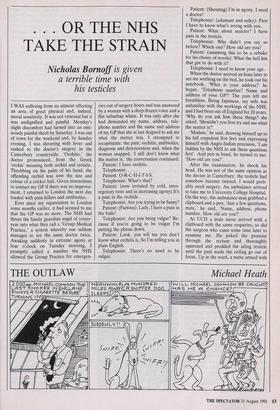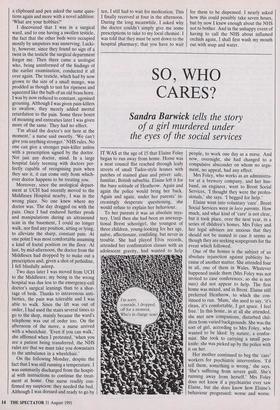. . . OR THE NHS TAKE THE STRAIN
Nicholas Bornoff is given
a terrible time with his testicles
I WAS suffering from an ailment affecting an area of great physical and, indeed, moral sensitivity. It was not venereal but it was undignified and painful. Monday's slight discomfort had turned into an omi- nously painful throb by Saturday. I was out of town for the weekend and, by Sunday evening, I was shivering with fever and rushed to the doctor's surgery in the Canterbury countryside. `Orchitis,' the doctor pronounced, from the Greek `orchis' meaning both orchid and testicle. Throbbing on the palm of his hand, the offending orchid was now the size and colour of a cricket ball. Given instructions to contact my GP if there was no improve- ment, I returned to London the next day loaded with pain-killers and antibiotics.
Ever since my repatriation to London some months earlier, it had seemed to me that the GP was no more. The NHS had thrust the family guardian angel of yester- year into what they call a 'Group Medical Practice,' a system whereby one seldom manages to see the same doctor twice. Awaking suddenly in extreme agony at four o'clock on Tuesday morning, I promptly called a number the NHS allowed the Group Practice for emergen-
cies out of surgery hours and was answered by a woman with a deep-frozen voice and a flat suburban whine. It was only after she had demanded my name, address, tele- phone number and the name and address of my GP that she at last deigned to ask me what the matter was. I attempted to recapitulate: the pain; orchitis; antibiotics; diagnosis and deterioration and, when the woman snapped, 'I still don't know what the matter is,' the conversation continued: Patient: I have orchitis.
Telephonist• Patient: O-R-C-H-I-T-I-S.
Telephonist: What's that?
Patient: (now irritated by cold, inter- regotory tone and in increasing agony) It's a pain in the orchids. Telephonist: Are you trying to be funny? Patient: (Furious): Lady, I have a pain in the balls!
Telephonist: Are you being vulgar? Be- cause if you're going to be vulgar I'm putting the phone down.
Patient: Look, you tell me you don't know what orchitis is. So I'm telling you in plain English.
Telephonist: There's no need to be vulgar.
Patient: (Shouting) I'm in agony. I need a doctor!
Telephonist: (adamant and sulky): First I have to know what's wrong with you.
Patient: What about testicles? I have pain in the testicle.
Telephonist: Why didn't you say so before? Which one? How old are you?
Patient: (assuming this to be a rebuke for his choice of words): What the hell has that got to do with it?
Telephonist: I need to know your age. When the doctor arrived an hour later to see me writhing on the bed, he took out his notebook. 'What is your address?' he began. 'Telephone number? Name and address of your GP?' The pain left me breathless. Being Japanese, my wife was unfamiliar with the workings of the NHS, and I had been out of England for 20 years. `Why do you ask him these things? she asked. 'Shouldn't you first try and see what the matter is?'
`Madam,' he said, drawing himself up to his full corpulent five feet and expressing himself with Anglo-Indian precision, 'I am bidden by the NHS to ask these questions first'. And pen in hand, he turned to me: 'How old are you?'
After the examination, he shook his head. He was not of the same opinion as the doctor in Canterbury: the testicle had somehow become twisted. I would prob- ably need surgery. An ambulance arrived to take me to University College Hospital. On the way, the ambulance man grabbed a clipboard and a pen. 'Just a few questions, mate,' he said, 'Name, address, phone number, How old are you?'
At UCH a male nurse arrived with a clipboard with the same enquiries; so did the surgeon who came some time later to examine me. He poked the prostate through the rectum and thoroughly squeezed and prodded the ailing testicle until the pain made the ceiling go out of focus. Up in the ward, a nurse armed with a clipboard and pen asked the same ques- tions again and more with a novel addition: `What are your hobbies?'
I discovered that I was in a surgical ward, and to one having a swollen testicle, the fact that the other beds were occupied mostly by amputees was unnerving. Lucki- ly, however, since they found no sign of a twist in the testicle the surgical department forgot me. Then there came a urologist who, being uninformed of the findings of the earlier examination, conducted it all over again. The testicle, which had by now grown to the size of a small mango, was prodded as though to test for ripeness and squeezed like the bulb of an old brass horn.
I was by now reduced to constant, agonised groaning. Although I was given pain-killers to swallow, they merely added mental retardation to the pain. Some three hours of moaning and entreaties later I was given more of the same. They had no effect.
`I'm afraid the doctor's not here at the moment,' a nurse said sweetly. 'We can't give you anything stronger.' NHS rules. No one can give a stronger pain-killer unless with a prescription signed by the doctor.
Not just any doctor, mind. In a large hospital fairly teeming with doctors per- fectly capable of recognising pain when they see it, it can come only from which- ever doctor happens to be treating you.
Moreover, since the urological depart- ment at UCH had recently moved to the Middlesex Hospital nearby, I was in the wrong place. No one knew where my doctor was. The day dragged on with the pain. Once I had endured further prods and manipulations during an ultrasound scan in the basement, I could no longer walk, nor find any position, sitting or lying, to alleviate the sharp, constant pain. At one point I was most comfortable assuming a kind of foetal position on the floor. At last, by mid-afternoon, the doctor from the Middlesex had dropped by to make out a prescription and, given a shot of pethidine, I fell blissfully asleep.
Two days later I was moved from UCH to the Middlesex; my being in the wrong hospital was due less to the emergency-call doctor's surgical leanings than to a shor- tage of beds. Thanks to intravenous anti- biotics, the pain was tolerable and I was able to walk. Since the lift was out of order, I had used the stairs several times to go to the shop, mainly because the ward's telephone was out of order too. On the afternoon of the move, a nurse arrived with a wheelchair. 'Even if you can walk,' she affirmed when I protested, 'when you are a patient being transferred, the NHS rules are that we must take you downstairs to the ambulance in a wheelchair.'
On the following Monday, despite the fact that I was still running a temperature, I was summarily discharged from the hospit- al with instructions to continue the treat- ment at home. One nurse readily con- firmed my suspicion: they needed the bed. Although I was dressed and ready to go by ten, I still had to wait for medication. This I finally received at four in the afternoon. During the long meanwhile, I asked why the doctor couldn't simply give me some prescriptions to take to my local chemist. I was told that they must be sent down to the hospital pharmacy; that you have to wait for them to be dispensed. I nearly asked how this could possibly take seven hours, but by now I knew enough about the NHS not to bother. And in the unhappy event of having to call the NHS about inflamed orchids again, I shall first wash my mouth out with soap and water.











































 Previous page
Previous page